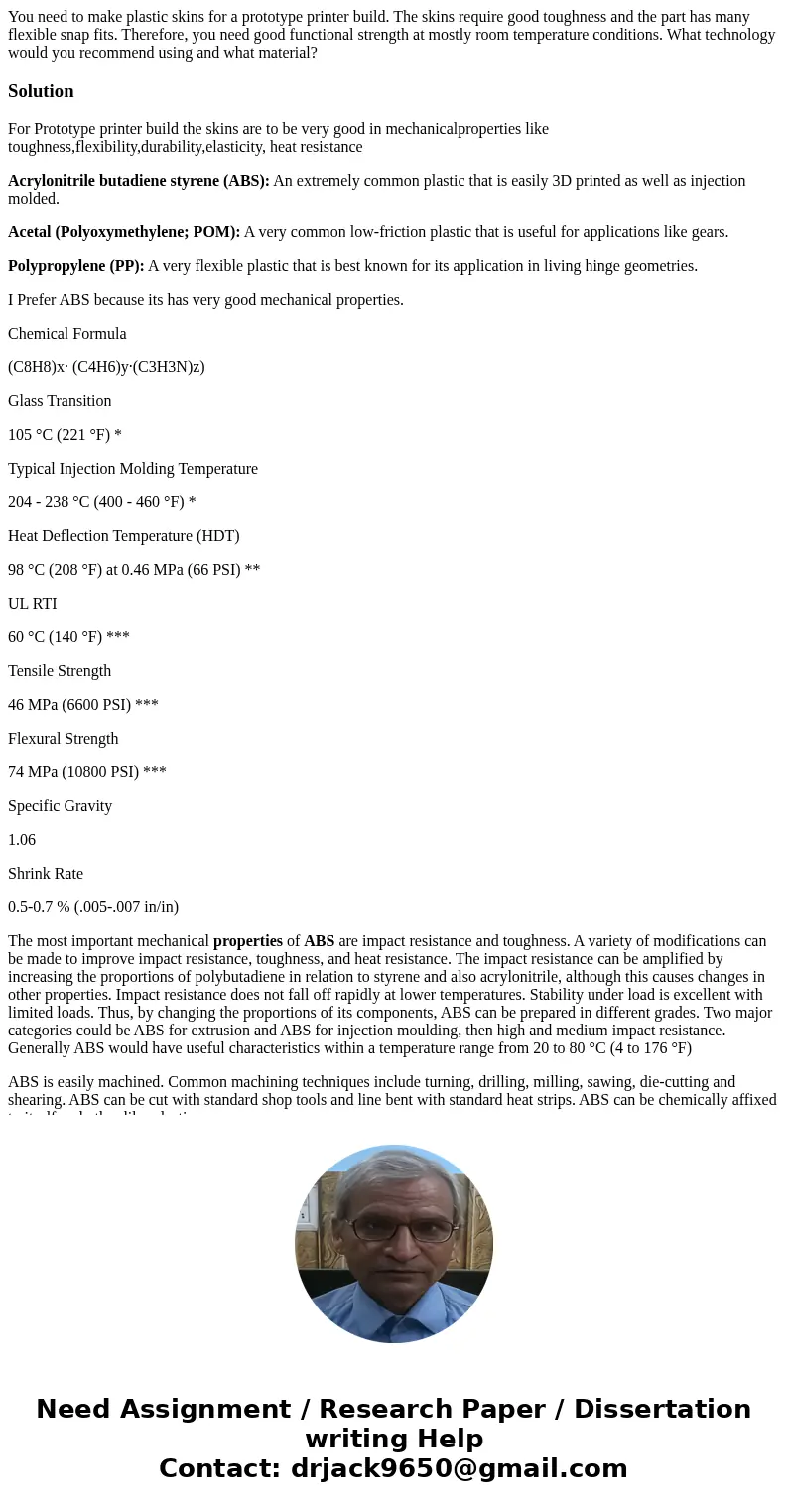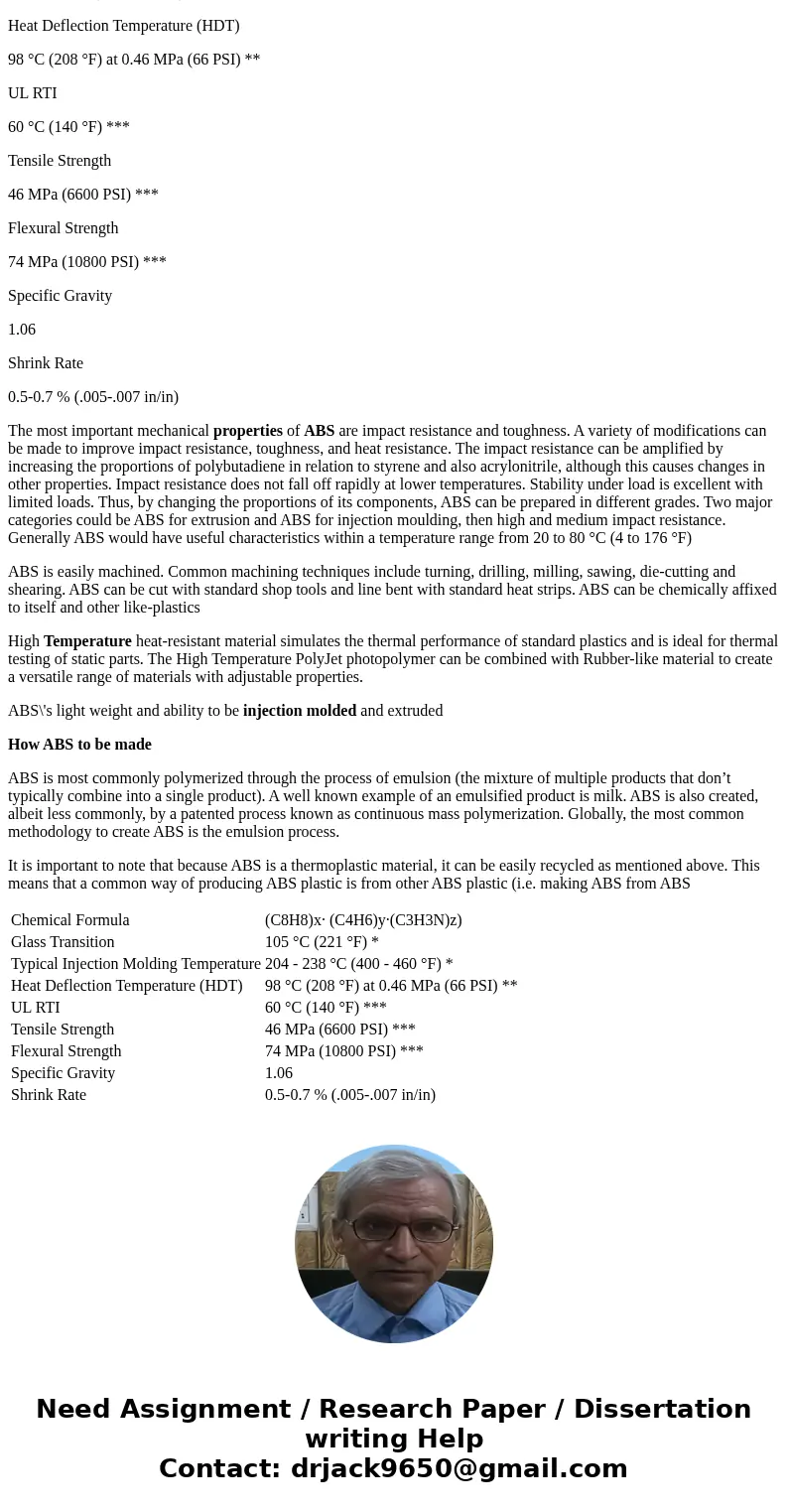You need to make plastic skins for a prototype printer build
Solution
For Prototype printer build the skins are to be very good in mechanicalproperties like toughness,flexibility,durability,elasticity, heat resistance
Acrylonitrile butadiene styrene (ABS): An extremely common plastic that is easily 3D printed as well as injection molded.
Acetal (Polyoxymethylene; POM): A very common low-friction plastic that is useful for applications like gears.
Polypropylene (PP): A very flexible plastic that is best known for its application in living hinge geometries.
I Prefer ABS because its has very good mechanical properties.
Chemical Formula
(C8H8)x· (C4H6)y·(C3H3N)z)
Glass Transition
105 °C (221 °F) *
Typical Injection Molding Temperature
204 - 238 °C (400 - 460 °F) *
Heat Deflection Temperature (HDT)
98 °C (208 °F) at 0.46 MPa (66 PSI) **
UL RTI
60 °C (140 °F) ***
Tensile Strength
46 MPa (6600 PSI) ***
Flexural Strength
74 MPa (10800 PSI) ***
Specific Gravity
1.06
Shrink Rate
0.5-0.7 % (.005-.007 in/in)
The most important mechanical properties of ABS are impact resistance and toughness. A variety of modifications can be made to improve impact resistance, toughness, and heat resistance. The impact resistance can be amplified by increasing the proportions of polybutadiene in relation to styrene and also acrylonitrile, although this causes changes in other properties. Impact resistance does not fall off rapidly at lower temperatures. Stability under load is excellent with limited loads. Thus, by changing the proportions of its components, ABS can be prepared in different grades. Two major categories could be ABS for extrusion and ABS for injection moulding, then high and medium impact resistance. Generally ABS would have useful characteristics within a temperature range from 20 to 80 °C (4 to 176 °F)
ABS is easily machined. Common machining techniques include turning, drilling, milling, sawing, die-cutting and shearing. ABS can be cut with standard shop tools and line bent with standard heat strips. ABS can be chemically affixed to itself and other like-plastics
High Temperature heat-resistant material simulates the thermal performance of standard plastics and is ideal for thermal testing of static parts. The High Temperature PolyJet photopolymer can be combined with Rubber-like material to create a versatile range of materials with adjustable properties.
ABS\'s light weight and ability to be injection molded and extruded
How ABS to be made
ABS is most commonly polymerized through the process of emulsion (the mixture of multiple products that don’t typically combine into a single product). A well known example of an emulsified product is milk. ABS is also created, albeit less commonly, by a patented process known as continuous mass polymerization. Globally, the most common methodology to create ABS is the emulsion process.
It is important to note that because ABS is a thermoplastic material, it can be easily recycled as mentioned above. This means that a common way of producing ABS plastic is from other ABS plastic (i.e. making ABS from ABS
| Chemical Formula | (C8H8)x· (C4H6)y·(C3H3N)z) |
| Glass Transition | 105 °C (221 °F) * |
| Typical Injection Molding Temperature | 204 - 238 °C (400 - 460 °F) * |
| Heat Deflection Temperature (HDT) | 98 °C (208 °F) at 0.46 MPa (66 PSI) ** |
| UL RTI | 60 °C (140 °F) *** |
| Tensile Strength | 46 MPa (6600 PSI) *** |
| Flexural Strength | 74 MPa (10800 PSI) *** |
| Specific Gravity | 1.06 |
| Shrink Rate | 0.5-0.7 % (.005-.007 in/in) |


 Homework Sourse
Homework Sourse